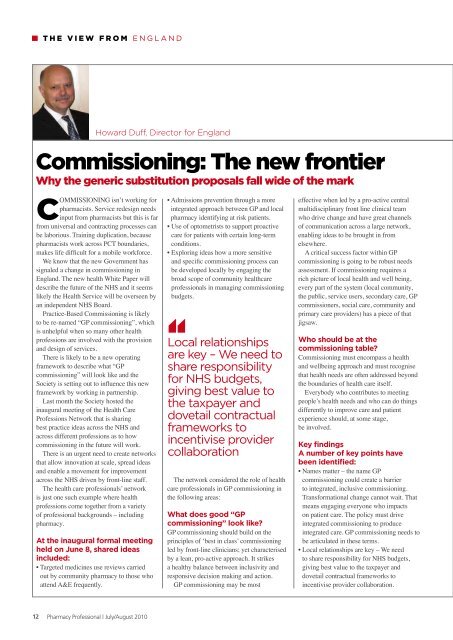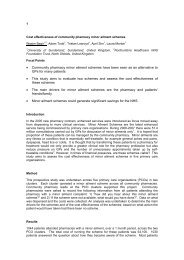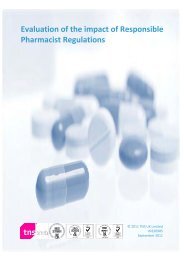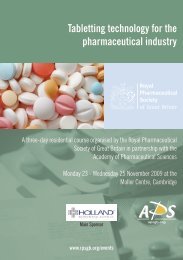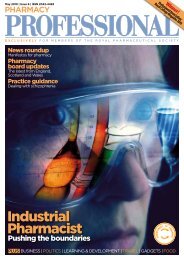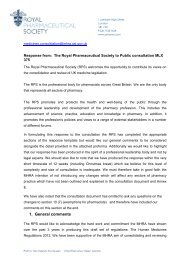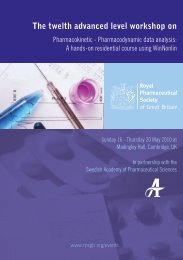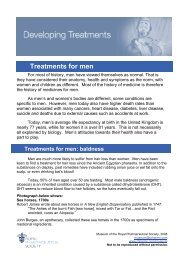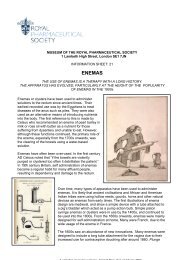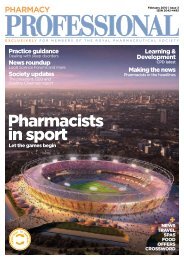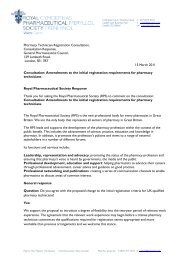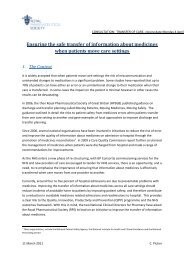victorian Pharmacy - Royal Pharmaceutical Society
victorian Pharmacy - Royal Pharmaceutical Society
victorian Pharmacy - Royal Pharmaceutical Society
Create successful ePaper yourself
Turn your PDF publications into a flip-book with our unique Google optimized e-Paper software.
T h e V i e w f r o m e n g l a n d<br />
Commissioning isn’t working for<br />
pharmacists. Service redesign needs<br />
input from pharmacists but this is far<br />
from universal and contracting processes can<br />
be laborious. Training duplication, because<br />
pharmacists work across PCT boundaries,<br />
makes life difficult for a mobile workforce.<br />
We know that the new Government has<br />
signaled a change in commissioning in<br />
England. The new health White Paper will<br />
describe the future of the NHS and it seems<br />
likely the Health Service will be overseen by<br />
an independent NHS Board.<br />
Practice-Based Commissioning is likely<br />
to be re-named “GP commissioning”, which<br />
is unhelpful when so many other health<br />
professions are involved with the provision<br />
and design of services.<br />
There is likely to be a new operating<br />
framework to describe what “GP<br />
commissioning” will look like and the<br />
<strong>Society</strong> is setting out to influence this new<br />
framework by working in partnership.<br />
Last month the <strong>Society</strong> hosted the<br />
inaugural meeting of the Health Care<br />
Professions Network that is sharing<br />
best practice ideas across the NHS and<br />
across different professions as to how<br />
commissioning in the future will work.<br />
There is an urgent need to create networks<br />
that allow innovation at scale, spread ideas<br />
and enable a movement for improvement<br />
across the NHS driven by front-line staff.<br />
The health care professionals’ network<br />
is just one such example where health<br />
professions come together from a variety<br />
of professional backgrounds – including<br />
pharmacy.<br />
At the inaugural formal meeting<br />
held on June 8, shared ideas<br />
included:<br />
• Targeted medicines use reviews carried<br />
out by community pharmacy to those who<br />
attend A&E frequently.<br />
Howard Duff, Director for England<br />
Commissioning: The new frontier<br />
Why the generic substitution proposals fall wide of the mark<br />
• Admissions prevention through a more<br />
integrated approach between GP and local<br />
pharmacy identifying at risk patients.<br />
• Use of optometrists to support proactive<br />
care for patients with certain long-term<br />
conditions.<br />
• Exploring ideas how a more sensitive<br />
and specific commissioning process can<br />
be developed locally by engaging the<br />
broad scope of community healthcare<br />
professionals in managing commissioning<br />
budgets.<br />
Local relationships<br />
are key – We need to<br />
share responsibility<br />
for NHS budgets,<br />
giving best value to<br />
the taxpayer and<br />
dovetail contractual<br />
frameworks to<br />
incentivise provider<br />
collaboration<br />
The network considered the role of health<br />
care professionals in GP commissioning in<br />
the following areas:<br />
What does good “GP<br />
commissioning” look like?<br />
GP commissioning should build on the<br />
principles of ‘best in class’ commissioning<br />
led by front-line clinicians; yet characterised<br />
by a lean, pro-active approach. It strikes<br />
a healthy balance between inclusivity and<br />
responsive decision making and action.<br />
GP commissioning may be most<br />
effective when led by a pro-active central<br />
multidisciplinary front line clinical team<br />
who drive change and have great channels<br />
of communication across a large network,<br />
enabling ideas to be brought in from<br />
elsewhere.<br />
A critical success factor within GP<br />
commissioning is going to be robust needs<br />
assessment. If commissioning requires a<br />
rich picture of local health and well being,<br />
every part of the system (local community,<br />
the public, service users, secondary care, GP<br />
commissioners, social care, community and<br />
primary care providers) has a piece of that<br />
jigsaw.<br />
Who should be at the<br />
commissioning table?<br />
Commissioning must encompass a health<br />
and wellbeing approach and must recognise<br />
that health needs are often addressed beyond<br />
the boundaries of health care itself.<br />
Everybody who contributes to meeting<br />
people’s health needs and who can do things<br />
differently to improve care and patient<br />
experience should, at some stage,<br />
be involved.<br />
Key findings<br />
A number of key points have<br />
been identified:<br />
• names matter – the name GP<br />
commissioning could create a barrier<br />
to integrated, inclusive commissioning.<br />
Transformational change cannot wait. That<br />
means engaging everyone who impacts<br />
on patient care. The policy must drive<br />
integrated commissioning to produce<br />
integrated care. GP commissioning needs to<br />
be articulated in these terms.<br />
• Local relationships are key – We need<br />
to share responsibility for NHS budgets,<br />
giving best value to the taxpayer and<br />
dovetail contractual frameworks to<br />
incentivise provider collaboration.<br />
• Public health improvement and prevention<br />
is bigger than general practice. Those whose<br />
health needs are the greatest are often<br />
unregistered or low users of the service.<br />
The new model of commissioning must be<br />
linked to joint strategic needs assessment<br />
(JsnA) to ensure local commissioning<br />
retains a public health focus.<br />
• Commissioning needs to be based on<br />
insights from the many. To create a rich<br />
commissioning picture, we need data and<br />
insights from all those who impact on<br />
people’s care.<br />
• Patients need to be fully involved in<br />
commissioning. Finding more effective<br />
ways of delivering patient and public<br />
involvement in commissioning will be<br />
critical to the success of any new model.<br />
The output from the event will inform<br />
thinking about how professionals other than<br />
GPs can inform commissioning – especially<br />
needs assessment. It will be used proactively<br />
to shape the Government’s new White Paper<br />
and aim to create a better environment for<br />
pharmacists. n<br />
The Health Professions<br />
Network “Key Messages” on<br />
commissioning:<br />
• The fact that it is going to be called GP<br />
commissioning presupposes a certain<br />
approach that creates a barrier to more<br />
inclusive commissioning beyond GPs. That<br />
is unfortunate as transformational change<br />
needs to engage everyone.<br />
• Local relationships are key and contractual<br />
frameworks need to incentivise<br />
collaboration.<br />
• The GP list is not necessarily a good focus<br />
for commissioning. It misses some people<br />
and is too simplistic to capture public<br />
health improvement, which is bigger than<br />
general practice.<br />
• Commissioning needs to involve and<br />
integrate the insights and thinking<br />
(including the data available about the<br />
patient) from all those who impact on<br />
care; including patients themselves.<br />
Lindsey Gilpin<br />
Chair of the English<br />
<strong>Pharmacy</strong> Board<br />
Supervision – the debate<br />
he responsible pharmacist regulations<br />
Tare part one of a two part process – the<br />
second part is remote supervision.”<br />
I lost count of the number of times I said<br />
that or something very similar late last year.<br />
I was so worried that pharmacists would<br />
not be ready for the responsible pharmacist<br />
regulations that I spoke to any group who<br />
would listen. Did I understand where the<br />
whole concept of the regulations had come<br />
from? No. Did I remember ever having any<br />
sort of in depth discussion about the whole<br />
concept? No again.<br />
The Department of Health, no doubt with<br />
the best of intentions, had taken us down<br />
a road that few of us understood, let alone<br />
supported.<br />
That is not the way a professional body<br />
should behave and from now on, it is not the<br />
way the new <strong>Society</strong> will behave. This time,<br />
right from the beginning, we will be involving<br />
the great and the good of pharmacy – but<br />
now that is you, the members.<br />
There is no doubt that there is plenty to<br />
think about when it comes to supervision.<br />
There may be some overriding principles<br />
such as ensuring the safety of the public and<br />
making sure they have reasonable access to<br />
a pharmacist, there may be other parts to<br />
supervision that you feel could be changed –<br />
do you want to be aware of the sale of every<br />
packet of paracetamol while you are in the<br />
consulting room, are you happy this could be<br />
done by a properly trained assistant provided<br />
there are no queries?<br />
So please start thinking about supervision<br />
and while you are doing this, give a bit<br />
of time for a review of the responsible<br />
pharmacist regulations too.<br />
Community pharmacists, how are the new<br />
rules working for you, have they made a<br />
difference or not? If you are a locum do you<br />
really read all the SOPs before you start work?<br />
How about those SOPs, do you think they<br />
should be independently validated?<br />
Do you personally want to check every<br />
item on a prescription, for accuracy as well<br />
as clinically? Who do you think should bear<br />
responsibility if things go wrong? Do you<br />
think checked and bagged items might be<br />
given out without a pharmacist present?<br />
Would you have more confidence using<br />
Accredited Checking Technicians if their<br />
training was accredited by the GPhC?<br />
Community<br />
pharmacists, how are<br />
the new rules working<br />
for you, have they<br />
made a difference<br />
Hospital practice – do the responsible<br />
pharmacist regulations have any valid<br />
application, what is the responsible<br />
pharmacist actually responsible for and if<br />
anything goes wrong who will end up being<br />
taken to court?<br />
You see how many questions arise when<br />
you start to look afresh at how pharmacy<br />
actually works.<br />
Fortunately, between us we will have the<br />
answers, we will find a way that works for<br />
us and keeps the core principles like patient<br />
safety always to the fore.<br />
We are putting in place a series of<br />
consultations, we will work with others,<br />
the Pharmacists’ Defence Association, the<br />
Guild of Healthcare Pharmacists, employers’<br />
organisations etc. We will put together a<br />
programme of consultations via the LPFs, via<br />
the website, via webinars and I hope that<br />
every Board member will end up speaking to<br />
any group of pharmacists who will listen.<br />
We need to get this right for the future of<br />
community and hospital pharmacy. We all<br />
need to input into this. Please start thinking<br />
now so that when the debate gets fully<br />
underway, you can play your part.<br />
Supervision. We’re starting the debate;<br />
we’d like you to join in. n<br />
12 <strong>Pharmacy</strong> Professional | July/August 2010<br />
July/August 2010 | <strong>Pharmacy</strong> Professional<br />
13


